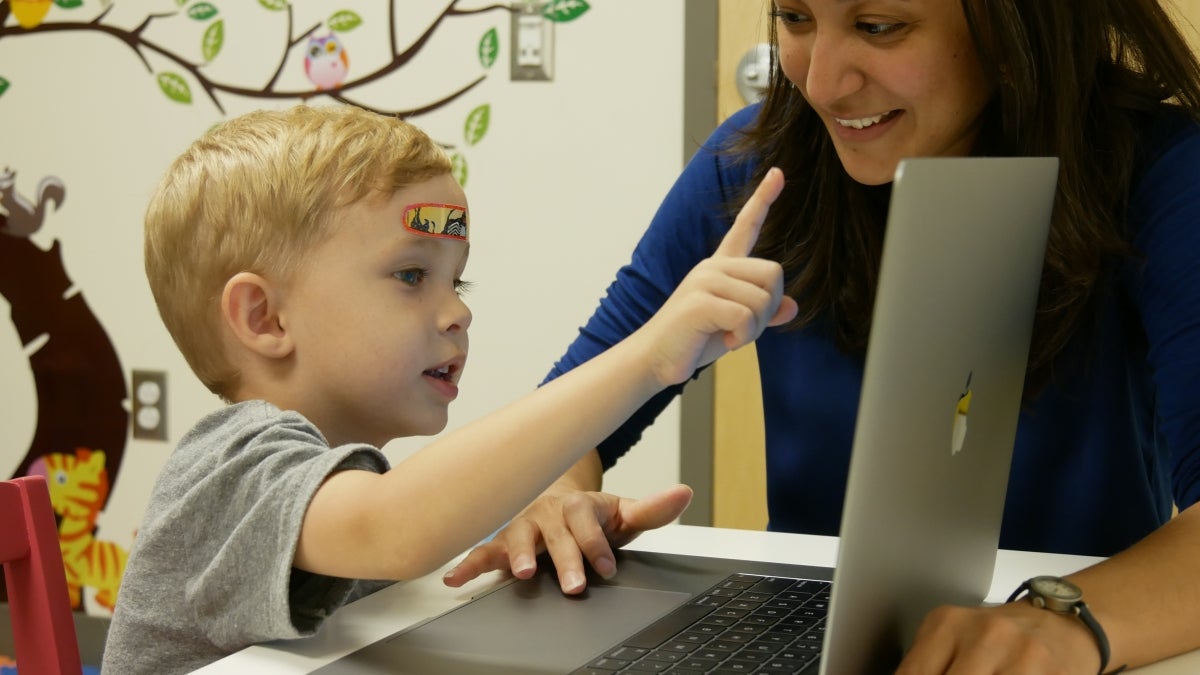Expecting to learn: Language acquisition in toddlers improved by predictable situations

The first few years of a child’s life are crucial for learning language, and though scientists know the “when,” the “how” is still up for debate. The sheer number of words a child hears is important; that number predicts school performance. In an upcoming study in Current Biology, published online Aug. 16, researchers at the Arizona State University Department of Psychology report an additional factor that is important for language: the predictability of the learning environment.
The study taught 2-year-old children novel words in predictable and unpredictable situations.
Predictability is useful for all kinds of learning, not just language. Researchers know children and adults form expectations about what will happen and learn when those expectations are violated. For example, a child might learn the stove is not the same as the kitchen countertop when it is warm to the touch.
“Children are very sensitive to the predictable regularities in their environment, and we wanted to test how predictability affects their language learning,” said Viridiana Benitez, assistant professor of psychology and lead author of the study.
A bosa, tulver, sarn and pisk
During the experiment, toddlers sat on their parent’s lap in front of a large screen. The screen showed four closed boxes, one in each corner of the screen. Inside the boxes were pictures of novel and unfamiliar shapes. In the first part of the experiment, the boxes opened one at a time and always in the same order. The sequence of box openings was predictable, but the object inside the box was not.
After five repetitions of the boxes opening and closing in the same order, the researchers started giving the objects names. Like the objects, the names were also novel, such as “pisk,” “bosa” or “tulver.” The children heard the name of the object after the box opened and their gaze was fixed on that box. The researchers tracked where the children were looking with a special camera that was mounted beneath the screen.
On half of the trials when the children heard names for the objects, the boxes opened in the expected order. On the other half of the object-naming trials, a box would open out of order.
“This experimental design separated the content of what the children were learning — the object-label pairings — from the predictability of the situation,” Benitez said. “We were able to show that just predicting something, like when and where to look, had a cascade effect on learning something new.”
Predictability increased learning
The researchers also used the child’s gaze to test whether they learned the novel words. Two objects were shown on the screen, and the children were asked questions like “Where is the sarn?” The researchers used the eye-tracking camera to see if the children looked at the correct object.
In this way, the researchers compared how well children learned the names of objects when the boxes opened in the expected order to how well they learned when the boxes opened unpredictably.
The researchers completed the experiment twice, with two different groups of 2-year-olds. The results were the same in both experiments: toddlers learned the novel words better when the boxes opened in order, or when their environment was predictable.
“We have known for some time that infants and children are amazing statistical learners,” said Linda Smith, professor of psychological and brain sciences at Indiana University. Smith studies cognitive development in infants and young children and was not involved with the study. “The findings from this study have important implications for both education and parenting. Regularities in the everyday lives of children and in the classroom can support learning.”
Information from unpredictable events can be useful for learning. Unexpected events can cause children and adults alike to pay more attention to what just happened, but these findings suggest predictable situations in a young child’s environment might create advantageous learning moments, in particular for language acquisition.
“When situations are predictable, young children do not have to keep track of what is different than expected,” Benitez said. “They know exactly what will happen next, and this might allow children to learn better.”
The study was completed with Jenny Saffran, professor of psychology at the University of Wisconsin-Madison, and will be published in the Sept. 10 print issue of the journal.
This work was supported by the National Science Foundation (award 1513834).
Top photo: Viridiana Benitez, assistant professor of psychology instructs Emmett Ewing in a learning task on the computer. Photo by Robert Ewing
More Science and technology

Indigenous geneticists build unprecedented research community at ASU
When Krystal Tsosie (Diné) was an undergraduate at Arizona State University, there were no Indigenous faculty she could look to in any science department. In 2022, after getting her PhD in genomics…

Pioneering professor of cultural evolution pens essays for leading academic journals
When Robert Boyd wrote his 1985 book “Culture and the Evolutionary Process,” cultural evolution was not considered a true scientific topic. But over the past half-century, human culture and cultural…

Lucy's lasting legacy: Donald Johanson reflects on the discovery of a lifetime
Fifty years ago, in the dusty hills of Hadar, Ethiopia, a young paleoanthropologist, Donald Johanson, discovered what would become one of the most famous fossil skeletons of our lifetime — the 3.2…